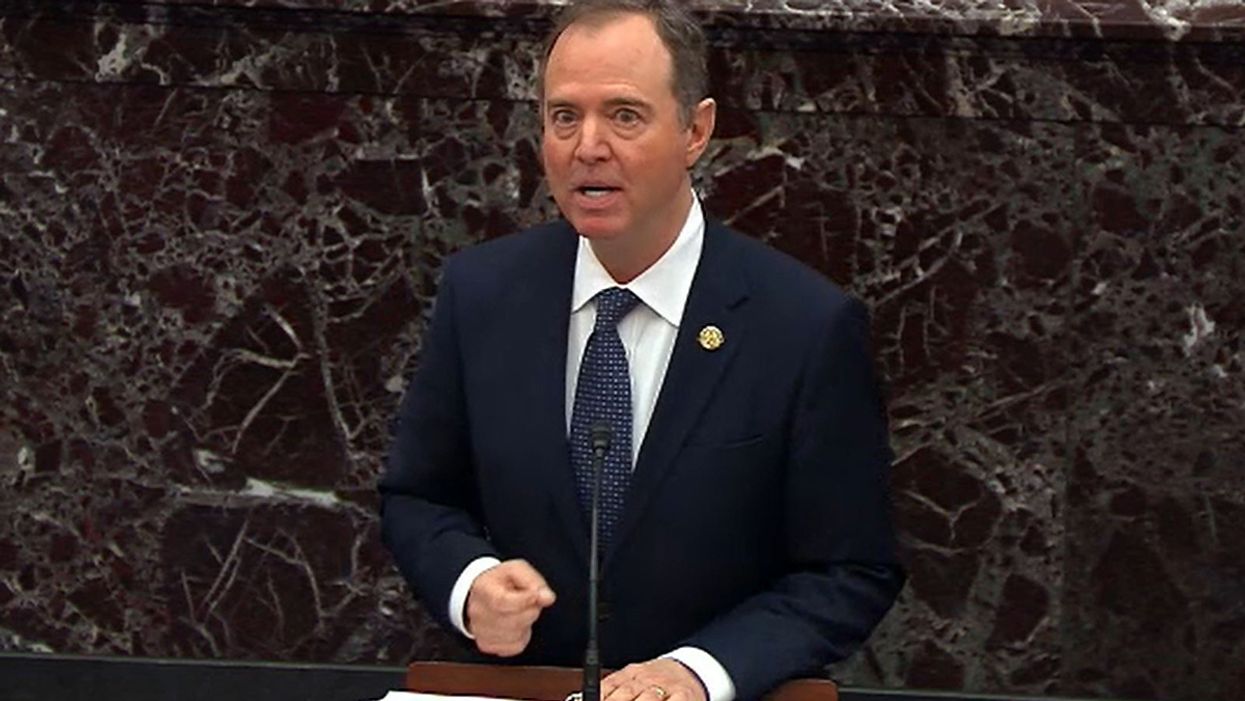
Senate Television via Getty Images

Seriously?
Closing arguments in the Senate's impeachment trial wrapped up Monday with some far-reaching arguments from two of the House's impeachment managers.
On the one hand, House Intelligence Committee Chairman Adam Schiff (D-Calif.) claimed that, if non-criminal acts aren't impeachable, President Donald Trump would be able to trade away a U.S. state to Russia for political assistance.
During his closing arguments, Schiff attacked the position that only criminal actions rise to the constitutional standard of "high crimes and misdemeanors" as grounds for impeachment. If non-criminal actions aren't impeachable, the California Democrat argued, then "a whole range of utterly unacceptable conduct in a president would now beyond reach."
For example, Schiff claimed, "Trump could offer Alaska to the Russians in exchange for support in the next election, or decide to move to Mar-a-Lago permanently and let Jared Kushner run the country, delegating to him the decision whether to go to war."
He added, "Because those things are not necessarily criminal, this argument would allow that he could not be impeached for such abuses of power."
On the other hand, there was the assertion from Rep. Val Demings (D-Fla.) that only guilty people don't cooperate with investigations against them, and therefore President Trump is guilty as charged.
"Once he got caught, President Trump engaged in categorical and indiscriminate obstruction of any investigation into his wrongdoing," Demings said of the White House's refusal to cooperate with the House's impeachment investigation. "He ordered every government agency and every official to defy the House's impeachment inquiry. And he did so for a simple reason: To conceal evidence of his wrongdoing from Congress and the American people."
The congresswoman went on to claim, "The president's obstruction was unlawful and unprecedented, but it also confirmed his guilt." That's because, "Innocent people don't try to hide every document and witness especially those that would clear them. That's what guilty people do. That's what guilty people do. Innocent people do everything they can to clear their name and provide evidence that shows that they are innocent."
Just for reference, the presumption of innocence implies that the burden of proof for someone's guilt rests on the side making the guilty claim, not on the accused person.
"This is most assuredly not how our system of jurisprudence works. Innocent people — especially those with reason to suspect that an investigation might be biased or corrupt — are very well advised to assert every single one of their rights and privileges along the way," HotAir's Ed Morrissey rebutted. "Innocent people are not required to exonerate themselves; prosecutors are required to use all lawful means to provide evidence of their guilt beyond a reasonable doubt."
For those fatigued by this entire impeachment saga so far, the good news is that the end is near and a final Senate vote on the matter is expected Wednesday afternoon.